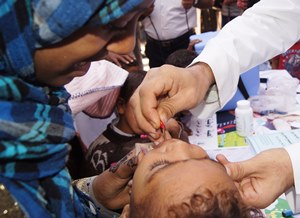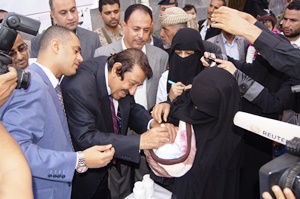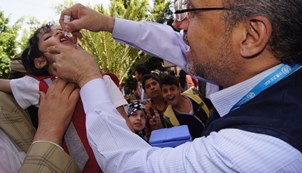 15 August 2015 -- A national polio, measles and rubella campaign was launched today in the Sana’a governorate of Yemen. The 5-day campaign supported by WHO, UNICEF and the Vaccine Alliance (GAVI) aims to vaccinate 5 657 620 children under the age of 5 against polio and around 1.8 million children aged from 6 months to 15 years against measles and rubella.
15 August 2015 -- A national polio, measles and rubella campaign was launched today in the Sana’a governorate of Yemen. The 5-day campaign supported by WHO, UNICEF and the Vaccine Alliance (GAVI) aims to vaccinate 5 657 620 children under the age of 5 against polio and around 1.8 million children aged from 6 months to 15 years against measles and rubella.
“Keeping Yemen polio free has been a major priority for WHO and its partners over the past 4 years and we are doing everything we can to maintain this great achievement; this campaign is essential and critical to maintain a polio-free status in Yemen, as well as minimize the risk of any potential importation of poliovirus in the country during the current crisis,” said Dr Ahmed Shadoul, WHO Representative to Yemen.
 “The measles and rubella campaign is equally much needed to prevent an occurrence of any fatal outbreaks; increasing the immunity of internally displaced persons (IDPs) and host community children less than 15 years, we will minimize their risk and exposure to measles, which of late, started showing rising trends,” he added.
“The measles and rubella campaign is equally much needed to prevent an occurrence of any fatal outbreaks; increasing the immunity of internally displaced persons (IDPs) and host community children less than 15 years, we will minimize their risk and exposure to measles, which of late, started showing rising trends,” he added.
Throughout the campaign, WHO has supported the Ministry of Public Health and Population with micro-planning, implementation, supervision, and monitoring vaccination among high-risk groups, such as IDPs, and people living in areas of high incidence of measles cases. After the campaign, WHO will also provide support to the post-campaign evaluation. WHO is contributing to the financial support of this campaign.
More than 40 500 health workers and supervisors in fixed and mobile teams will take part in the campaign. An estimated 4132 officials of local councils, imams of mosques and health educators are mobilizing support for the campaign.
This is the first vaccination campaign in 2015; in a normal year, WHO, UNICEF and GAVI support the Ministry of Public Health and Population to conduct 4 vaccination campaigns per year, however, due to the security situation in Yemen that has limited accessibility of most parts of the country, this has not been possible, leaving many children at risk of vaccine preventable diseases.
 “We call for all conflicting parties to allow vaccinators, health teams and volunteers to do their humanitarian work and make it easy for them to reach targeted areas to ensure that every child is vaccinated against these fatal diseases,” said Dr Osama Mere, Immunization and Polio Officer, WHO Yemen.
“We call for all conflicting parties to allow vaccinators, health teams and volunteers to do their humanitarian work and make it easy for them to reach targeted areas to ensure that every child is vaccinated against these fatal diseases,” said Dr Osama Mere, Immunization and Polio Officer, WHO Yemen.
“The threat of disease outbreaks is imminent and unless effective immunization activities are conducted, polio might return to Yemen and measles could spread widely and rapidly,” said Dr Mere.
The armed conflict in most of Yemen’s 23 governorates has posed problems to the Expanded Programme on Immunization, including difficulties in distributing vaccines to health facilities, fuel shortages affecting vaccine storage and inability of people to reach health facilities.
Despite the gains, funding shortages in Yemen are putting all children at risk. The scope and scale of the crisis, and the unimaginable hardships that the Yemeni children have suffered stretch our ability to respond. If the immediate and longer term funding gaps are not met, millions of children will not receive life-saving interventions, including polio and routine immunization that they need.
WHO and its partners will continue to support the Ministriy of Public Health and Population in increasing vaccination coverage in Yemen.
Related links
Read situation reports on the health situation in Yemen
For more information please contact:
Ms Pauline Ajello
Communication Officer
WHO – Yemen
email:
Cette adresse email est protégée contre les robots des spammeurs, vous devez activer Javascript pour la voir.
mobile: +962797140902
Mr Sadeq Al-Wesabi
Communication officer
WHO - Yemen
email:
Cette adresse email est protégée contre les robots des spammeurs, vous devez activer Javascript pour la voir.
Cette adresse email est protégée contre les robots des spammeurs, vous devez activer Javascript pour la voir.
mobile: +967 733096603





